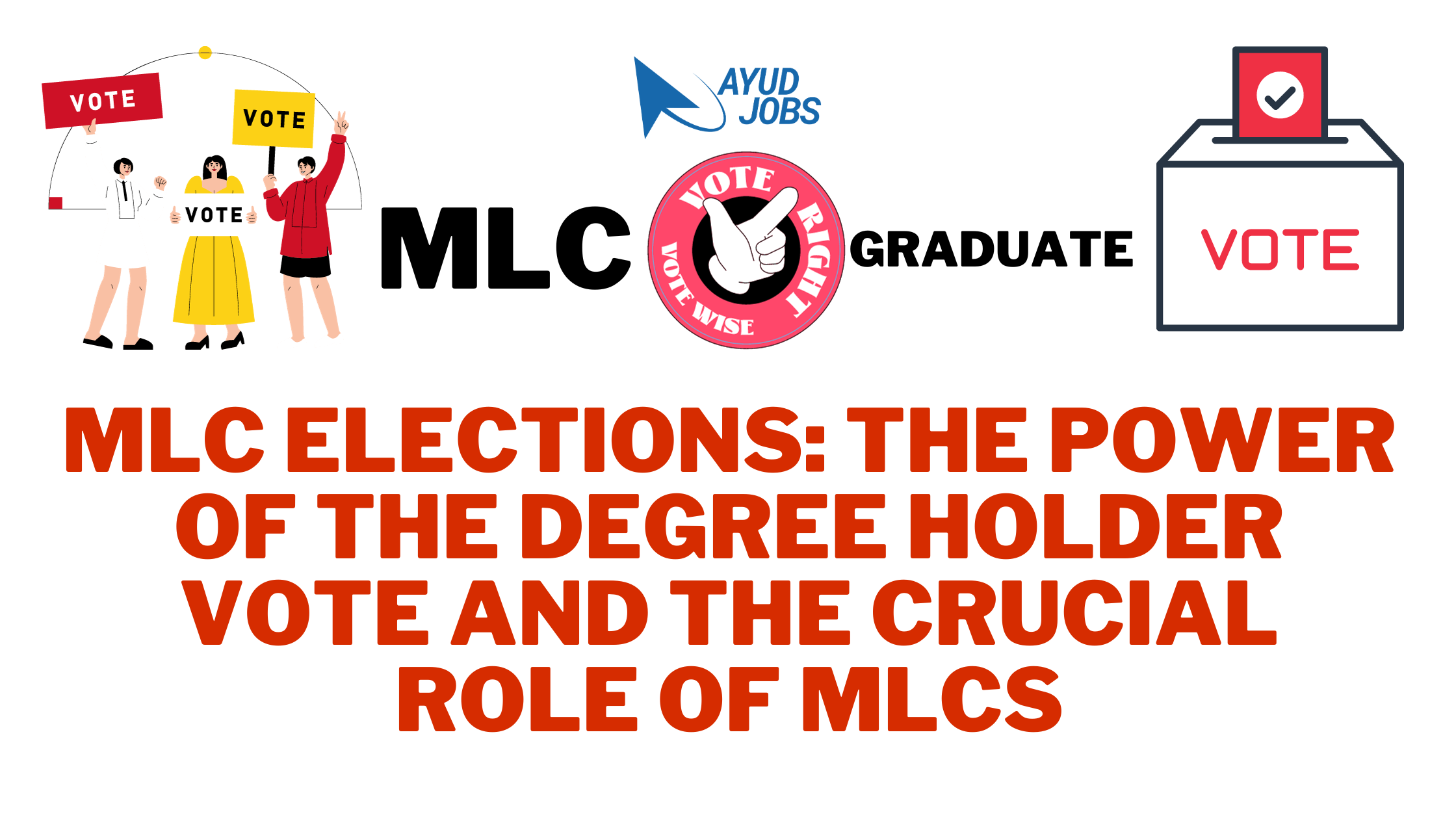MLC Elections: The Power of the Degree Holder Vote and the Crucial Role of MLCs
MLC Elections: The Power of the Degree Holder Vote and the Crucial Role of MLCs
Introduction
Members of the Legislative Council (MLCs) play a pivotal role in shaping the legislative landscape of a region or state. The question of why degree holders can cast their votes in MLC elections often arises, and it’s important to understand the reasons behind this. MLC Elections: The Power of the Degree Holder Vote and the Crucial Role of MLCs. In this blog, we will delve into the significance of MLC elections, the empowerment of degree holders in the voting process, and the crucial roles that MLCs perform in ensuring effective governance.
Understanding MLC Elections
MLC elections, also known as Legislative Council elections, are a fundamental part of the democratic process in many regions. These elections aim to select representatives for the upper house of a bicameral legislature, where the lower house consists of directly elected representatives. MLCs are tasked with crafting and scrutinizing legislation, representing their constituents, and offering valuable insights into the governance of a region.
The Empowerment of Degree Holders
In many places, MLC elections grant degree holders the right to vote. This inclusion of degree holders in the electoral process reflects a recognition of the importance of education and its role in shaping the future. By allowing degree holders to cast their votes, the electoral process becomes more inclusive and ensures that individuals with a deeper understanding of policy, governance, and society have a say in the selection of MLCs.
Why Degree Holders?
Degree holders are typically well-educated individuals who have acquired knowledge and critical thinking skills through higher education. They are more likely to analyze policies and legislation critically and make informed decisions about the candidates who will represent them in the upper house. Including degree holders in MLC elections helps ensure that candidates are chosen based on their qualifications and their ability to contribute meaningfully to the legislative process.
The Role of MLCs
MLCs hold significant responsibilities in the legislative process. Their roles are crucial to the effective functioning of the government, and they impact the lives of citizens in various ways:
1. Legislative Oversight: MLCs review and debate proposed legislation, ensuring that laws are well-considered and serve the best interests of the public.
2. Policy Advocacy: MLCs advocate for policies that address the needs and concerns of their constituents, often focusing on issues related to education, healthcare, infrastructure, and social welfare.
3. Representation: They represent their region or state at the state level, bringing local concerns and interests to the attention of the government.
4. Checks and Balances: MLCs provide checks and balances on the executive branch of government, preventing the concentration of power and ensuring accountability.
5. Advisory Role: They offer expert advice and insights on complex matters, utilizing their knowledge to enhance the quality of governance.
The Importance of MLCs
MLCs are essential for maintaining a well-rounded and effective legislative system. They bring diversity to the decision-making process, ensuring that multiple perspectives are considered. The inclusion of degree holders in MLC elections adds an educational dimension to this diversity, making the legislative body more informed and reflective of the society it represents.
A Real-Time Example
To better illustrate the importance of MLCs, let’s consider a real-time example:
Imagine a state grappling with issues related to public education. MLCs, including those who are degree holders, can play a pivotal role in shaping policies and advocating for educational reform. With their expertise, they can propose initiatives that improve access to quality education, address teacher shortages, and ensure that schools are adequately funded. Their ability to critically analyze data and make data-driven decisions can lead to positive changes in the state’s educational system, benefiting countless students.
Conclusion
MLC elections are not just about the selection of representatives; they are about empowering degree holders to contribute to the legislative process. By allowing those with higher education to cast their votes, we ensure that qualified and knowledgeable individuals have a say in the governance of their region. MLC Elections: The Power of the Degree Holder Vote and the Crucial Role of MLCs. MLCs, in turn, play vital roles in shaping policies, advocating for their constituents, and providing checks and balances within the government. Their importance cannot be overstated, and they are key players in the democratic framework of any region or state.
#ayud #ayudjobs #askayud #MultiLanguageSupport #ResumeBuilder #gotestit #ayudian
Join our what’s app channel for timely updates
Click here to install Ayud Jobs App from Playstore
The Power of Every Vote: How Increased Voter Turnout Can Impact India’s Democracy
The Power of Every Vote: How Increased Voter Turnout Can Impact India’s Democracy
https://ayudjobs.blog/mastering-knowledge-with-gotestit-the-ultimate-quiz-platform/








